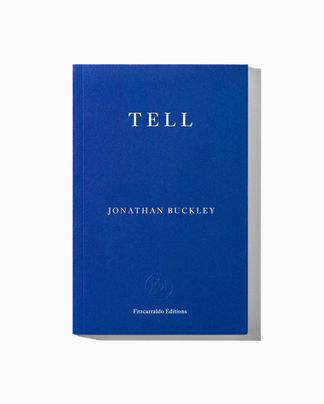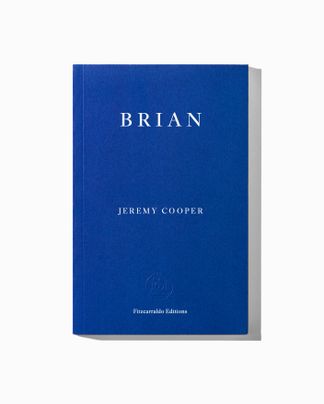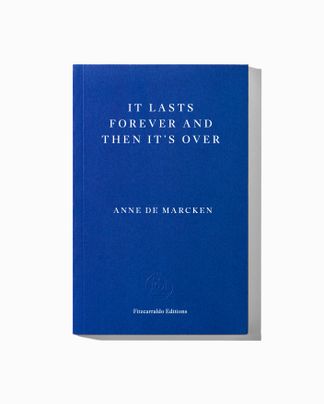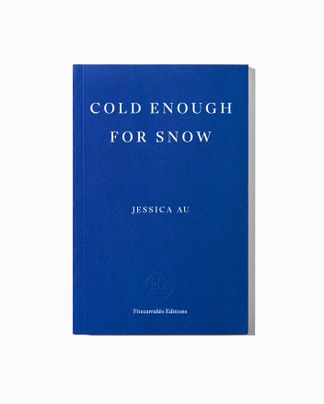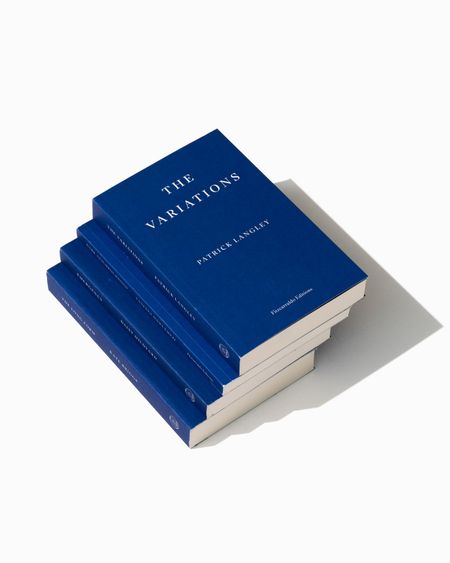On losing her father, Teresa returns to a small town on the Greek coast – the same place she visited when grieving her mother nine years ago. She immerses herself again in the life of the town, observing the inhabitants going about their business, a quiet backdrop for her reckoning with herself. An episode from her first visit resurfaces vividly – her encounter with John, a man struggling to come to terms with the violent death of his nephew. Soon Teresa encounters some of the people she met last time around: Petros, an eccentric mechanic, whose life story may or may not be part of John’s; the beautiful Niko, a diving instructor; and Xanthe, a waitress in one of the cafés on the leafy town square. They talk about their longings, regrets, the passing of time, their sense of who they are. Artfully constructed, absorbing and insightful, One Boat is a brilliant novel grappling with questions of identity, free will, guilt and responsibility.
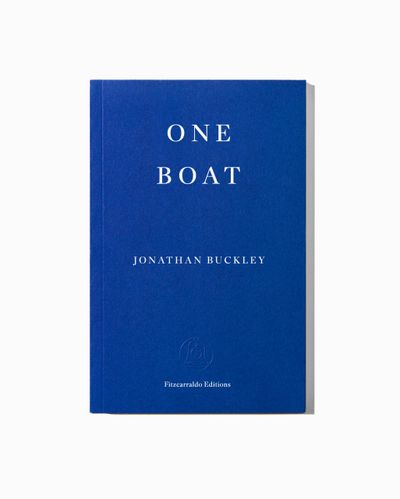
One Boat
French paperback with flaps, 168 pages | Published 13 March 2025 | Audiobook read by Caroline Ford
Longlisted for the Booker Prize 2025
One Boat
I.
The first time, the intention was simply to find a place that was quiet, but not somnolent. A town rather than a village. There had to be activity to observe. A few tourists, but only a few. Not too many people like myself. That was the plan, if it could be called a plan. During the stay, I would put my thoughts in order. I had pictured where this procedure would be carried out: a small square, the focal point, with café tables in the shade of a huge plane tree, an assortment of shops, whitewashed walls, the small hotel in which I would stay. At all times of day, encounters would occur there. In the evening, dozens would congregate.
The most popular resorts in the vicinity were to the east of the airport, and so were the nearest historical sites of significance. Drive north and I would be leaving the sea behind – the sea was a prerequisite; sand was not. To the south lay the city, then the bay. Therefore it had to be west, initially. I followed the coast, and the road turned south.
An hour later: a small town of immediate potential – optimum size, and open to the sea. Tables on the waterfront. No English overheard in the course of a meander through the streets. On the other side of the headland, a long and almost unpopulated beach – ideal for solitude, which would at some point be required. The main square, though, was not suitable: what I had imagined was a space in the centre of a town, through which everyone would pass, but this was not in the centre, and its café was no place for lingering.
Onward, another thirty kilometres, westward now, leaving the water for a while, and then another town and another headland, occupied by a fort which tapered to a little causeway and a pale stone tower. The square was close by, and also pretty, but again not what had been envisaged – it was too neatly picturesque. Insufficient wear and tear in evidence. The beach, across the road, did not satisfy either: the sand was as drab as concrete. A woman stood a long way out, in dead water that did not reach her waist.
From there the road led north, in the lee of a long, high, wooded hill, with green fields and olive trees on the other side, and the road became a slot through greenery, which had an effect on the mood – green being the colour of refreshment, tranquillity, resurgence, optimism – before the view opened out and water reappeared: a huge bay, with mountains beyond, on the horizon. Then I saw the town, and the words arose in my head, as clearly as if they were being spoken: ‘This will be the place.’
The plateia might have been created to order: a truncated triangle, touching the waterfront at its base, arcaded along the other two sides, with cafés and shops, and a lot of small tables and much-used chairs beneath plane trees, and some palms and a conifer, rising over a pavement of gleaming stone. A monument, an obelisk of white marble, was flanked by two cannons, supported on stone cradles. Children ran about; elders drank and smoked. There was no hotel on the square itself but I soon found one, perfectly situated, on a road that ramped up from the plateia, overlooking the town and the enormous bay. The decision to stay involved no deciding.
‘Five nights,’ I answered the receptionist. ‘Perhaps longer. If possible.’ I would be flying home in a fortnight, and intended to drive around, once the thought-ordering had been accomplished, or at least partly achieved. The school term had not ended, so the hotel was not yet busy. Accommodation would be available, whatever was decided. The new guest’s vagueness aroused some curiosity – and few, it seemed, stayed for so long.
The position of the restaurant, with tables at the water’s edge, determined the choice. The waiter enquired, ‘Just one?’ I heard an undertone of sympathy. ‘Oh yes,’ I told him, with a face that signified huge pleasure that this was so. I was aware of intermittent scrutiny. A single female diner, looking around, might be misconstrued as someone in need of company, so I took out the notebook and pen, to raise a modest barrier. It signified Do Not Disturb clearly enough, I would have thought, but it did not work. The man was intrigued, I wrote. ‘You are a writer?’ he asked, charmed – ‘Lord, no,’ I said, and left it at that, compounding the enigma. I made a note of the sunset’s colouring, I see. Water almost motionless, oil-like – a superfine oil – so many colours in the surface: violet, indigo, peach, brass, dark jade. The more one looks, the more there are. Not enough names for them. The sun, sliding behind the long, jagged, narrow island that formed the outer wall of the bay, was for a moment a red-hot ball bearing, in a socket of rock. A jellyfish swam up to the wall, apparently. Not a word about my mother, or any thoughts, and the few lines written later, back at the hotel, make no mention of the first encounter with Petros, below the Ottoman castle, which definitely happened that night, after the meal, when I strolled along the waterfront road as far as it went, to the castle entrance. Coming back, I saw him on the slope, under the trees, surrounded by cats, a dozen of them, scrawny specimens, some of them semi-furless and unhealthy to the point of repulsiveness, milling around the bowls that the man had set on the ground, which he was now filling with a meaty slurry. As I passed, he looked up and tapped a finger to his brow. He was wearing a half-crushed Panama, a dull white T-shirt and fraying jeans; his hair was close-cropped and substantially grey, as was the beard – a handsome man, perhaps mid-forties. There was nothing more to the exchange – a brief salute, acknowledged by a smile.
It appears that the poetic mood returned when I was back at the hotel. Observed from the balcony, the multicoloured bands of light, trembling in the harbour were appreciated, as was the disposition of the buildings. The terrain governed the settlement. Opposite the rise on which the hotel stood, the Ottoman castle occupied a corresponding hill. Between them, the plateia met the water at the semi-circle of the harbour, which aligned with the central axis of the town. I made a note of my predilection for symmetry – a mania, Tom once called it – an appealing quirk, then. Out in the bay, a single boat was moving – a ruby on the flat black water.
(…)
‘A strange, sly and self-assured novel, in which both nothing and everything happens…. There is a great deal of freight on board One Boat, but it packs so neatly into 168 pages that it never feels overburdened. This is a novel to be returned to as a place in which to think, just as Teresa returns to her Greek town.’
— Frances Wilson, Times Literary Supplement
‘Buckley’s brief, deft narrative … is both rooted in place and vastly searching, touching on history, literature and philosophy, as well as crime and violence. It offers moments of lingering intensity. And then the story takes another turn, giving rise to meta questions about all that has gone before. Explorations of connection and presence drive this enigmatic, precise little web of a book.’
— Kirkus Reviews
‘Teresa’s story emerges in non-linear fragments of reminiscence and notebook scribbles…. An understated story about selfhood emerges from the flotsam of memories and jottings. When Buckley at last pulls back the metafictional curtain in the book’s final pages, he formalizes his narrator’s driftings and draftings. What seems at first a set of disparate, unpolished vignettes proves to be a masterfully unified conceit.’
— Rachel Armitage, Literary Review
‘Concise, confident, cryptic… The mystery at the heart of the novel, a connection that is only implied and never spelt out, is a clever way to probe Teresa’s desire for closure.’
— James Riding, The Times
‘Exactly why Buckley is not already revered and renowned as a novelist in the great European tradition remains a mystery that will perhaps only be addressed at that final godly hour when all the overlooked authors working in odd and antique modes will receive their just rewards.’
— Ian Sansom, Times Literary Supplement
Praise for Tell
‘Tell is one of the best new novels I’ve read in a while.’
— Benjamin Markovits, Telegraph
‘For anyone who wants their faith restoring in British fiction … Buckley has been pursuing his own quiet path for many years now, and this novel, an intriguing art world mystery told in the form of interview transcripts, is typically innovative and unsettling.’
— Jonathan Coe, Guardian
‘Given that so many of Buckley’s novels are concerned with ideas of memory, selfhood and storytelling, this is hardly new territory for him. Yet the interview conceit in Tell makes it feel fresh, the withholding of interiority requiring an unusual engagement. Don’t take the conversational prose at face value; underneath it lies a whole other set of mysteries besides Curtis’s. Pay attention and you’ll find them.’
— George Cochrane, Financial Times
‘Always well crafted, this novel is engaging in parts and digressive in others, which adds to its realism, capturing how people chatter their way down alleys, rarely hewing to the main road of a tale…. The buildup in Tell is perpetual, a sense that an explanation must be coming. But the author diverges from expectations and converges on reality, where remembering is not the same as understanding. Abruptly, someone may just disappear, and all that remains is the sight of a figure wandering across a bridge – no splash heard, just the fading ripples of “why.”’
— Tom Rachman, New York Times
‘Buckley has once again staged an absorbing debate: a philosophical refusal of narrative linearity that is replete with stories; a constellation of episodes that does not tell the whole tale.’
— Richard Robinson, Guardian
Jonathan Buckley is a writer and editor from the West Midlands, now living in Brighton. In 2015 he won the BBC National Short Story Award for ‘Briar Road’, and he is a regular contributor to the Times Literary Supplement. His previous novel, Tell, was the joint winner of the 2022 Novel Prize, a global, biennial award for a book-length work of literary fiction written in English, and was shortlisted for the 2024 Goldsmiths Prize. One Boat is his thirteenth novel, the second to come out with Fitzcarraldo Editions.

